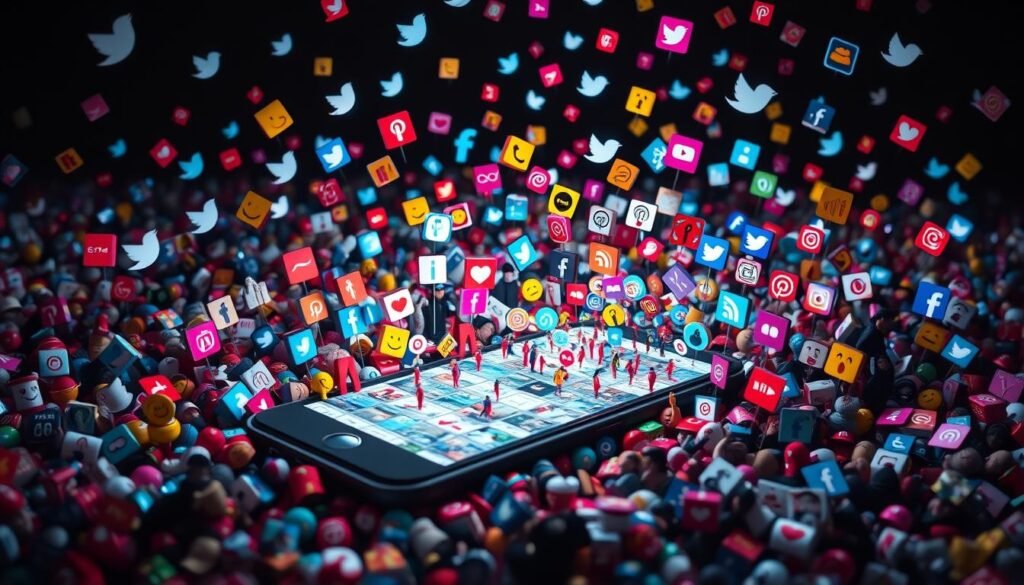Social Media App Banality: Navigating Digital Superficiality, Social media apps are a big part of our lives today. But, they also hide a dark side. The chase for digital perfection and constant approval has made our online world feel shallow and disconnected.
When we look at our feeds, we see perfect lives. This makes us compare ourselves and feel disconnected from our real lives. It hides our true struggles and makes us feel like we’re not good enough.
In this world of virtual approval, real human connection is hard to find. Our online personas, built for likes and shares, hide who we truly are. We long for true belonging and purpose. This search for approval can hurt our self-worth and make us rely too much on digital validation.
Key Takeaways
- The banality of social media apps has led to a disconnect between our online persona and our authentic selves.
- The pursuit of digital perfection and constant validation has created a culture of unrealistic expectations and social comparison.
- The virtual validation offered by social media can provide a fleeting sense of satisfaction, but it often fails to fulfill our deeper need for genuine human connection.
- Embracing digital wellbeing and mindful technology usage can help us navigate the complexities of the social media landscape.
- Cultivating self-awareness and a balanced approach to social media can empower us to break free from the trap of digital superficiality.
Unveiling the Illusion of Digital Perfection
In the world of social media, a strange trend has appeared: the chase for digital perfection. People create perfect online personas, showing a life that’s far from real. This search for online approval creates an illusion of perfect digital lives.
Content Curation and the Online Persona
Social media is where people show their ideal selves. They pick and choose what to share, making it seem perfect. This can make them feel like they’re not really themselves, trying to meet online standards.
Virtual Validation: A Fleeting Satisfaction
Getting likes, shares, and comments drives much of social media. People feel good when they get these, leading to more posts. But, this feeling doesn’t last, making them want more to feel complete.
This digital perfection illusion can harm our minds and feelings. It makes us feel far from our true selves and others. Knowing how this works is the first step to a healthier online life.
| Content Curation | Online Persona | Virtual Validation | Digital Perfection |
|---|---|---|---|
| Carefully selecting and filtering the content shared on social media to present an idealized version of oneself. | The online identity individuals construct, often differing from their authentic selves. | The pursuit of external affirmation and approval through likes, shares, and comments on social media. | The illusion of flawlessness and success perpetuated by social media users, often at odds with reality. |
Social Media App Banality: The Trap of Constant Comparison
In today’s world, social media apps have made constant comparison a norm. Users see perfect lives on their feeds and feel the urge to compare. This urge, known as social comparison, harms mental health and leads to internet addiction.
The rise of influencer culture makes things worse. People try to live like influencers show. Photos and content seem perfect, making users feel bad about themselves.
“Social media has become a breeding ground for comparison, where users often find themselves falling short of the idealized standards set by their peers and influencers.”
This endless comparison can hurt self-esteem and cause anxiety. It can even lead to internet addiction. People get caught up in getting likes and shares.
To escape this trap, we need to change how we use social media. We should focus on real connections and self-acceptance. By seeing the flaws in social media, we can value our real lives more.
Conclusion: Embracing Digital Wellbeing
As we explore the changing world of social media, it’s key to use technology wisely. We need to balance its good sides with its downsides. This way, we focus on our well-being more than seeking online approval.
By choosing digital wellbeing and using mindful technology, we can take back control of our digital lives. This might mean setting limits, managing our online image, and making real connections. It’s time to move past the surface of social media and value real interactions and experiences.
As we work towards a better tech relationship, we can unlock its full potential. We can grow personally, strengthen our bonds, and make a positive impact. By putting our digital well-being first, we can navigate the online world with clarity and purpose. This leads to more fulfillment in our digital lives.
FAQ
What is social media app banality?
Social media app banality is when platforms make us feel shallow and disconnected. They push for digital perfection and constant approval through perfect-looking posts and influencer culture.
How do social media platforms encourage the curation of online personas?
Social media encourages users to show off a perfect online self. People seek likes, shares, and comments for a quick feel-good. But, it hides our true selves.
What are the dangers of the social comparison trap on social media?
Seeing perfect lives online can make us feel bad about ourselves. It leads to constant comparison and can harm our mental health. We might feel addicted to the internet and unhappy as we try to match others’ success.
How can we embrace digital wellbeing and maintain a more mindful approach to technology use?
To improve digital wellbeing, we need to use technology wisely. Set limits, take breaks from screens, and be aware of how we use social media. Focus on real connections and our overall digital health to enjoy social media more.


